- 4 May 2016
- Business
-
(비지니스) 버리는 문화에 대항한 고쳐쓰는 비지니스아름다운 인생/비지니스 2016. 5. 4. 18:52
출처: http://www.bbc.com/news/business-35884856
Repair businesses provide antidote to throwaway culture (antidote: 해독제, 해결책)
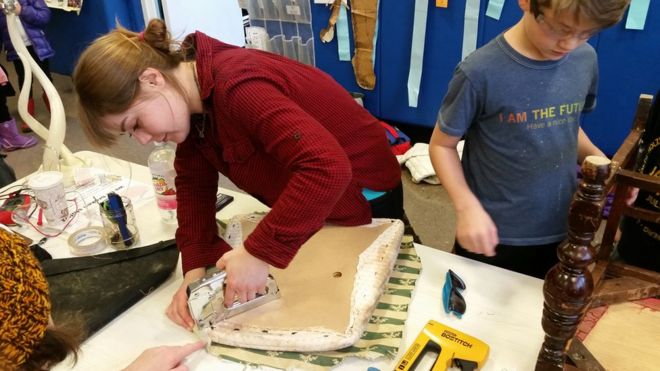
The hall of a primary school in Brooklyn is unusually busy for a Saturday morning.
This is a "pop-up repair" event, and it is drawing in the crowds. Parents and children from around the neighbourhood have brought in their broken things to be fixed by menders, each with their own area of expertise.
At different tables, repairers fix jewellery, electronics and furniture among many other things. This is also an opportunity to teach kids repair skills, and a group of boys is hammering away in the corner.
In the midst of this hive of noisy tinkering stands Sandra Goldmark.
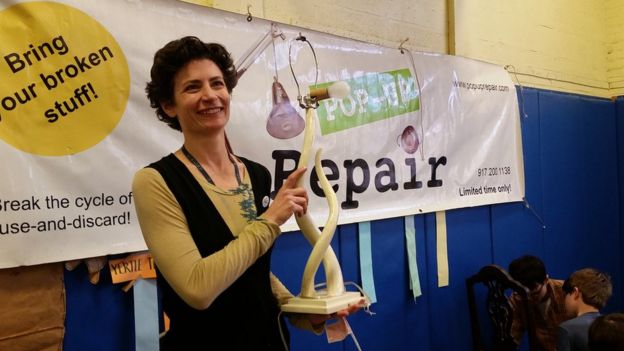
'Pop-up' repair events are proving increasingly popular 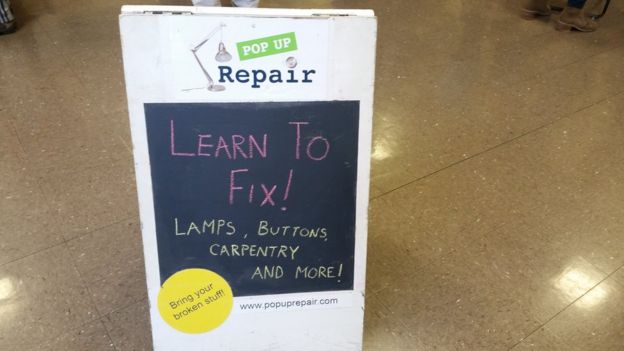
People often do not realise how easily items can be fixed "People hold on to their broken things for a long time," she says. "When we started, we found this huge pent-up demand for our services, because there was nowhere to get things repaired."
Ms Goldmark, who is a set designer and theatre professor, created Pop Up Repair three years ago with her husband, who is also in theatre production.
Initially launched with a crowdfunding campaign and a team of handy backstage theatre professionals, Pop Up Repair fixes a range of items - toys, glasses, furniture and clothing. Repairs start at $15.
'Internal resistance'
In addition to the practical repairs, Ms Goldmark also wanted Pop Up Repair to fuel a broader conversation about consumption and waste in modern living.
"The system leads you to throw things away and buy new, but we've found that people have an internal resistance to this," she says.
The idea of mending things, as opposed to replacing them, is one that is gaining traction in the US.
It fits into a broader zeitgeist about living a more sustainable lifestyle - Ms Goldmark goes so far as to call it a movement, albeit one that's still in its infancy.
"I liken it to the food movement from 30 years ago," she says. "People are beginning to realise that the overabundance of cheap 'stuff calories', if you like, doesn't make us happier or our homes healthier."
'Environmental concerns'
But while there is a heightened interest in mending, there are entrenched obstacles to the revival of repair as an industry.
In California, Jamie Facciola created her business, Repair Revolution, with the specific mission of reducing those obstacles.
Ms Facciola is a repair evangelist, driven primarily by environmental concerns.
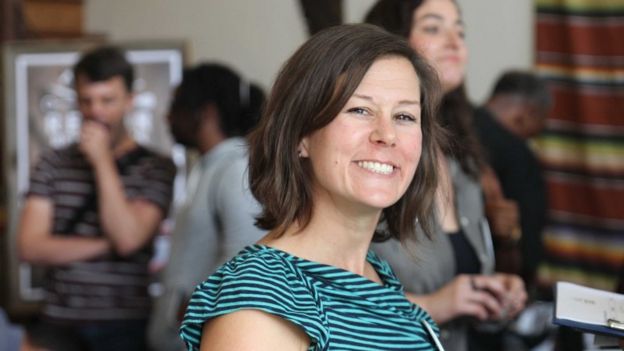 Haleh Hatami, Bay Mozaic
Haleh Hatami, Bay MozaicMs Facciola is trying to change public perceptions of repairing 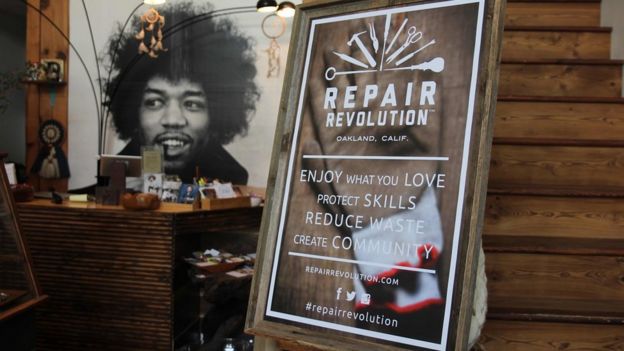 Haleh Hatami, Bay Mozaic
Haleh Hatami, Bay MozaicRepair revolution also tries to encourage people to repair things themselves "People care about local businesses, and the artfulness of things, but they don't recognise repair in this way," she says. "I'm reframing repair with these values - artisanal, skilled and using local talents."
For Ms Facciola, repair is linked to larger trends like the "maker movement" and the "circular economy", all of which resonate particularly with the younger generation of millennials.
Repair Revolution also holds pop-up events in Oakland, California, which Ms Facciola says have been successful, connecting people with a network of repairers who might otherwise be hard to find.
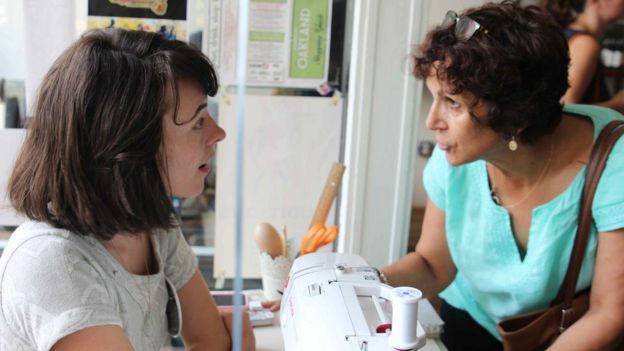 Haleh Hatami, Bay Mozaic
Haleh Hatami, Bay MozaicRepair revolution looks to put people in touch with repairers, who can be difficult to find There are also far fewer menders than there used to be, and Ms Facciola says "they're usually run by an older generation who are not on Twitter, and don't have webpages, which is how this younger generation goes about finding services".
'Education'
So awareness is a priority for repair businesses. In New York City, Denim Therapy is a small business that has provided a very niche service for 10 years, but does have an online and social media presence.
"It's been a process of education to get people to understand that jeans are repairable," says owner Francine Rabinovich. "And they've been very open to this message."
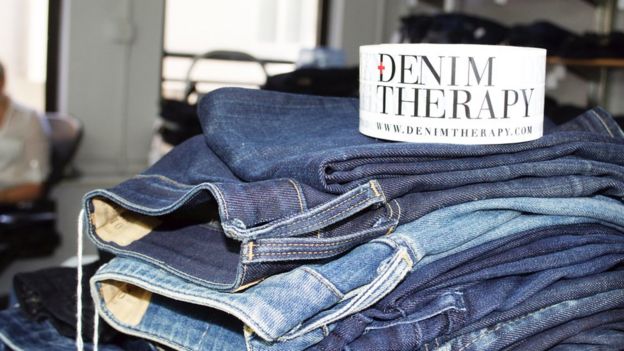 RAFFAEL FLORES CONTERAS
RAFFAEL FLORES CONTERASPeople are starting to understand they can repair their favourite jeans rather than throw them away 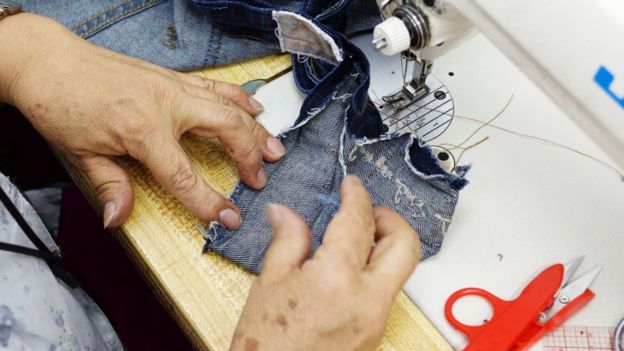 RAFFAEL FLORES CONTERAS
RAFFAEL FLORES CONTERASSome people are happy to pay a lot of money to repair their favourite jeans Ms Rabinovich has seen increased sales - over the last two years, she says Denim Therapy has gone from fixing about 700 pairs of jeans every month to a 1,000 pairs. She now outsources some work to a nearby tailor to keep up with the business.
"Sometimes the repair will cost more than the price of the jeans, and still people want to do it, because they're attached to them," she says.
Larger companies are also getting in on this trend - outdoor clothing store Patagonia will soon kick off the "Worn Wear" tour, where clothing repair experts will tour cities from San Francisco to Boston, fixing Patagonia's coats and outdoor clothing.
For Patagonia's founder Yvon Chouinard, this is part of a larger stance against over-consumption.
Back in California, Repair Revolution's Ms Facciola says that "we have convinced ourselves we don't need to repair things because we can always buy new, but our future won't sustain that."
She hopes the same market-based system that created our throw-away culture will help by ushering in a major resurgence in repair, and encourage repair businesses to thrive.
"In a market economy, we vote with our dollars, and there's proven demand for repair services.
"If we can send that market signal that we care about the repairability of things, that's a strong signal that can fill these gaps in the market."
'아름다운 인생 > 비지니스' 카테고리의 다른 글
(비지니스) 태양을 향해 운동하고 있는 수성 (0) 2016.05.10 (비지니스) 잭 마는 중국버전 복합언론재벌 루퍼트 머독인가? (0) 2016.05.05 (비지니스) 탈세를 제동걸고자 시행하는 것에는 무엇이 있는가? (0) 2016.04.13 (비지니스) 왜 파나마는 세계 10대 조세피난처에 해당 안 되나? (0) 2016.04.11 (비지니스) 왜 전세계 아기들은 베이비 박스 안에서 잠을 자는가? (0) 2016.04.06